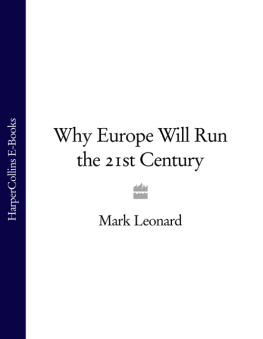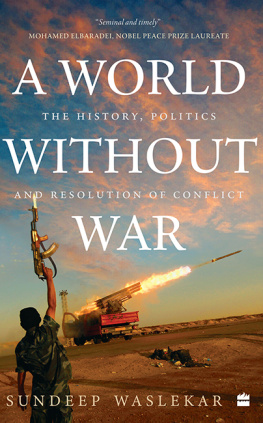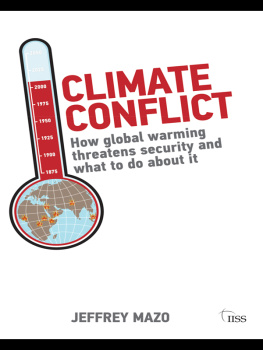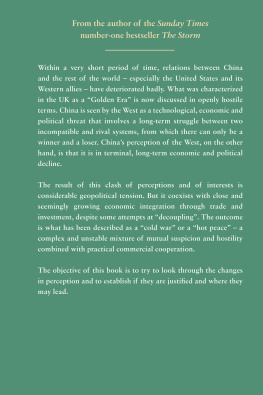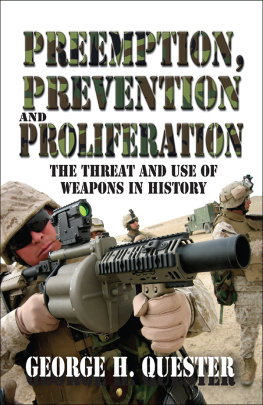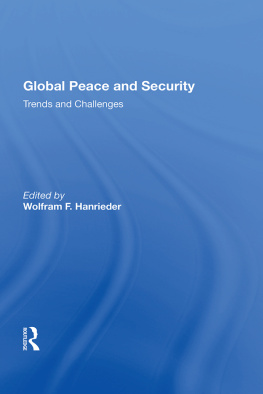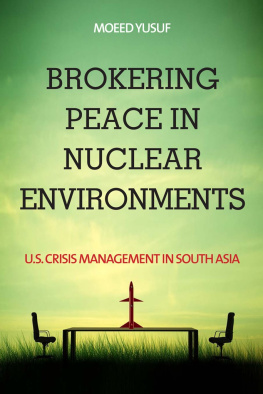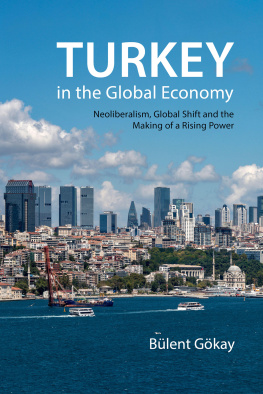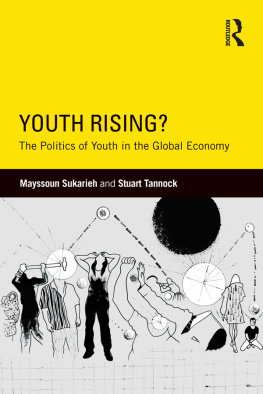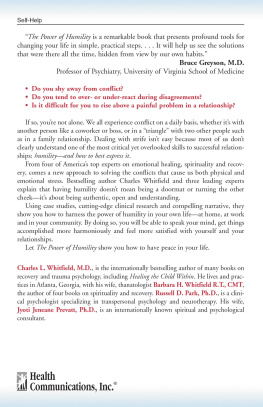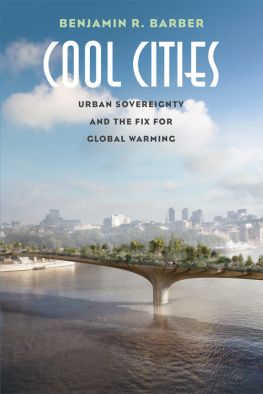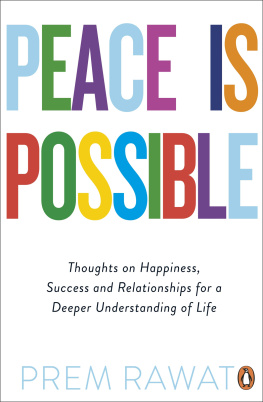Also by Mark Leonard
Why Europe Will Run the 21st Century
What Does China Think?
Mark Leonard
THE AGE OF UNPEACE
How Connectivity Causes Conflict

TRANSWORLD
UK | USA | Canada | Ireland | Australia
New Zealand | India | South Africa
Transworld is part of the Penguin Random House group of companies whose addresses can be found at global.penguinrandomhouse.com.

First published by Bantam Press in 2021
Copyright Mark Leonard 2021
The moral right of the author has been asserted
Every effort has been made to obtain the necessary permissions with reference to copyright material, both illustrative and quoted. We apologize for any omissions in this respect and will be pleased to make the appropriate acknowledgements in any future edition.
Cover image Getty Images
Cover design by Jack Smyth
ISBN: 978-1-473-59043-4
This ebook is copyright material and must not be copied, reproduced, transferred, distributed, leased, licensed or publicly performed or used in any way except as specifically permitted in writing by the publishers, as allowed under the terms and conditions under which it was purchased or as strictly permitted by applicable copyright law. Any unauthorized distribution or use of this text may be a direct infringement of the authors and publishers rights and those responsible may be liable in law accordingly.
For Mum and Dad
For Berni and Annele
For John, Marjorie, Richard and Andrew
For Graham, Susie and Guy
For Miriam, Phiroze and Isaac
For Jakob and Noa
For Gabrielle
INTRODUCTION:
The Connectivity Conundrum
We may be on the cusp of a new, silent pandemic. Like Covid-19, it is rampaging across the planet, spreading exponentially, exploiting the cracks in our networked world and constantly mutating to evade our defences. But unlike the virus which pits all of humanity against a disease, this new pandemic is being deliberately transmitted from human to human. It is not a biological force, but a set of toxic behaviours that are multiplying like a virus. The connections between people and countries are becoming weapons.
Just look at our response to Covid. There have not been enough vaccines, masks and gowns to go round and, rather than working together to increase global supplies, countries have used their stocks to bully others. When the virus first struck, the Chinese government hoarded medicines, masks and PPE. And when it spread, these supplies were used to bribe and to blackmail. Chinas allies Brazil, Serbia, and Italy were showered with masks and vaccines. But more critical states like Australia, France, the Netherlands, Sweden and the USA faced threats to withhold supplies unless their governments changed policy.
These toxic connections are not just about trade. In America when the Black Lives Matter protests raged over the George Floyd murder, a wave of African social media posts called for violence against the fascist police. It looked like a global political awakening, but it was orchestrated by troll factories in Ghana and Nigeria funded by the Russian state.
Conflict over technology itself is affecting the worlds biggest companies. Google and Huawei had worked together closely for years, building a partnership between the most successful handset maker and the most widely used operating system. But when America put the Chinese handset maker on a banned list, Google banned Huawei from its Android platform, leaving millions unable to update their phones and plunging Chinas tech giant into crisis.
Even states that are allies often seem to end up at loggerheads. For example, in December 2020 British supermarkets ran out of fruit and vegetables when the French government closed its borders. The ban on British lorries was ostensibly to control Covid, but it also put the squeeze on Downing Street in the Brexit endgame.
And while superpowers flex their muscles, weaker countries are making use of similar tactics to strike back. In the same year, the Iranian Navy seized oil tankers to protest against crippling sanctions, their piracy designed to break support for a financial blockade. A few months earlier, in nearby Turkey the president opened his countrys border to Greece, urging millions of Syrian refugees to seek a better life in Europe. His goal was not to help them follow their dreams but to use the threat of a wave of refugees to extort concessions from the European Union.
What do Chinese bullying, Russian trolling, American regulation, French blockades, Iranian piracy, and Turkish blackmail have in common? They were not random accidents like an asteroid falling from the sky or an earthquake but new types of political violence. Each was a weapon perfectly evolved to exploit a weakness in our connected world. Each time one country uses one, another reciprocates, creating a deadly spiral of tensions. And as we get further into the twenty-first century their use is spreading to pandemic proportions.
UNWAR AND UNPEACE
This is a short book with a simple idea: that the connections that knit the world together are also driving it apart. In a world where war between nuclear powers is too dangerous even to contemplate, countries are waging conflicts by manipulating the very things that link them together. And, as will become apparent later, it is connectivity itself that gives people the opportunity to fight, the reasons to compete, and the arsenal to deploy.
Rather than eliminating competition between countries, the deep interdependence seems to fuel it. Economic coercion is nothing new, but the hidden wiring of globalization is. And the ways that it is being manipulated give sanctions, blockades and PR campaigns a viral quality and deadliness that did not exist before our world was defined by networks. Although the journalist Thomas Friedman claimed that our globalized world is flat, it is in fact just the opposite an uneven and mountainous network. Some countries are more central to the system than others. They can cut rival nations off and use their control of hubs to assert their power as America does with the dollar and its control of the internet or China with its manufacture of medical supplies and access to rare earths. But even weak countries can target the strong with the right leverage as Iran is doing by blocking shipping routes or Turkey by using refugees as pawns.
Should we think of these new conflicts as connectivity wars? Sort of, but not quite. The alternation between war and peace has shaped human history, defining the borders of our countries, and influencing the nature of our social contracts, the structure of our economies and the purpose of our politics. It has captured our imaginations and inspired some of our greatest poems and novels. However, Tolstoy would not be able to write a masterpiece like War and Peace if he were alive today. Nobody could, because the distinction between war and peace has broken down.
The rules of war state that it should take place between sovereign states. It should begin with a declaration and end with a peace treaty. And the combatants should be soldiers who are clearly distinguished by their uniforms.
Those kinds of conventional wars have all but disappeared. They havent happened in Europe or America since the Second World War. And although the wars in the Middle East and Africa are tragic, the number of people they kill is tiny in historical terms. For the last couple of decades more people have committed suicide than died in armed combat.
Next page

